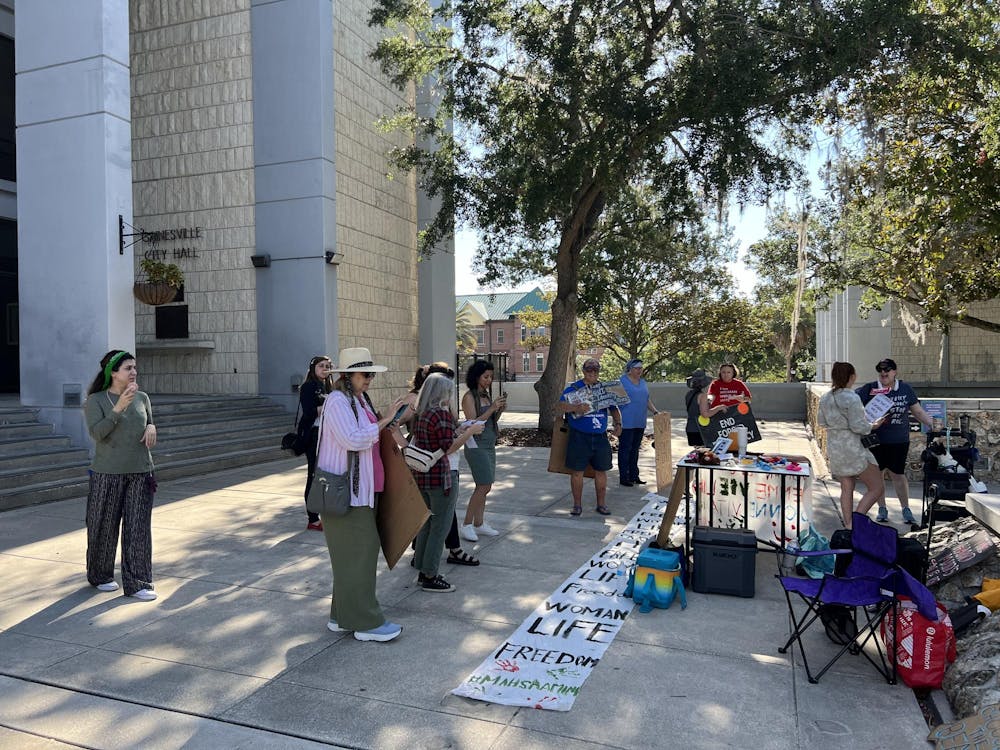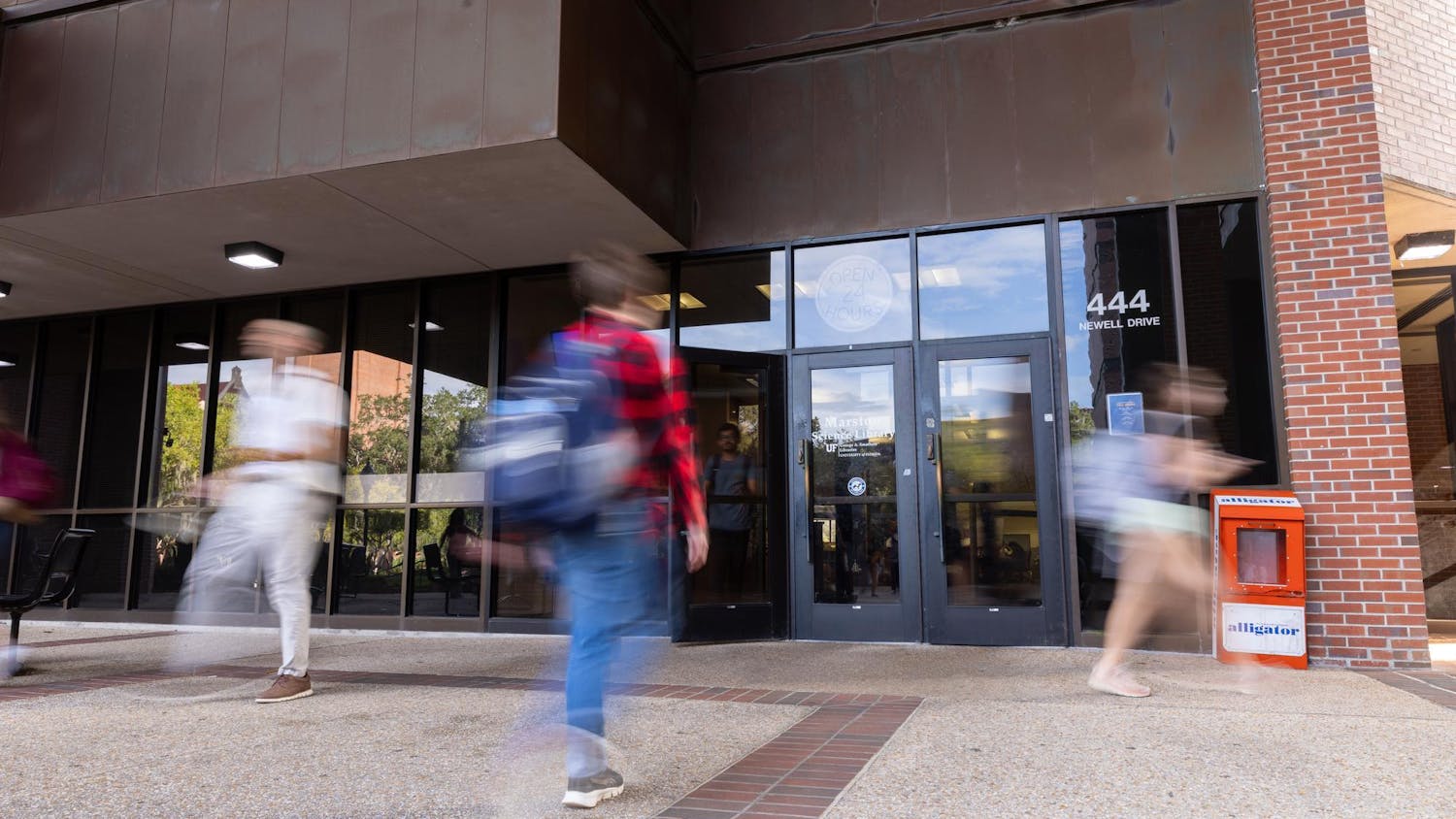The sun glared down on about two dozen demonstrators Monday as they marched down West University Avenue chanting “bans off our bodies.”
The Women’s March, a campaign advocating for women’s rights issues, including abortion, gender-based discrimination and sexual violence, spurred the demonstration. Following the 2022 U.S. Supreme Court decision to overturn Roe v. Wade, several states have imposed more stringent abortion restrictions. The creation and approval of Florida’s recent six-week ban, which took effect May 1, drew community criticism prior to its enactment.
However, the Florida Supreme Court approved an opposing initiative aiming to enshrine abortion access in the state constitution to appear on the November general election ballot, allowing voters to determine the accessibility of state reproductive health care.
The Women’s March protestors gathered outside Gainesville City Hall to give speeches and display signs reading “end forced pregnancy,” “feminists vs. fascists” and “mind your own uterus,” among others.
The event’s organizer, Misti Rucks, said she aimed to engage the community in advocating for reproductive health care following recent national and state legislation.
Rucks said the government shouldn’t have authority over that type of “personal and private decision.”
“We would like to peacefully protest to have health care access, not just abortion rights but all access to healthcare for our reproductive needs,” she said. “We are also demanding an end to gender-based violence so women don’t have to fear being sexually assaulted.”
Dismissive attitudes from doctors repeatedly prevented her from receiving treatment for a uterine fibroid, Rucks said. It took several visits to different doctors before she received treatment for the condition, which can cause pain and potential reproductive complications if left unchecked, she said.
“I had to fight for that healthcare, and it wasn’t even an abortion,” she said.
Jane McNulty, an Alachua County resident and protest attendee, received an abortion in 1976, which she said would have been an impossibility under current state law.
“It would have changed absolutely everything because I wouldn’t have been able to go to college, and I would have been forced into a marriage I did not want,” she said.
McNulty said abortion access in the 1970s was a “non-issue” only opposed by the religious, but as a Christian, she said religion instructs her to “love God and love your neighbor as yourself.”
“Jesus never said one word about abortion,” she said.
Reproductive health care restrictions only make victims of sexual crimes more vulnerable to financial, social and emotional hardship, said Rachel Mullins, a St. John’s County resident and social media influencer who has covered women’s issues on her podcast, No Filter Friday.
“I have interviewed countless survivors of gender based violence and sexual crimes,” Mullins said. “Just in states with total abortion bans, 64,000 pregnancies were conceived by rapists.”
Mullins said she personally experienced sexual harassment in Gainesville when a man exposed himself to her and was “completely undeterred” following her threats to call the police, an event that drew her to advocate for women’s empowerment in the city.
“We live in a Western country where we can stand up here and [protest],” she said. “We can make our own laws. That’s the whole point of this entire country, so fight back.”
Alachua County resident Suzy McGinnis said she protested in Gainesville during the 1970s, both to end the Vietnam War and advocate for women’s rights, leading her to attend the City Hall demonstration.
“This is about reproductive healthcare,” McGinnis said. “I feel that no one without a uterus has any say.”
Conservatives formed a campaign platform on abortion restrictions because “[white Christian men] blow [abortion issues] completely out of proportion,” she said.
Beside the group, two counter-protestors arrived at City Hall brandishing signs that read, “Jesus saves from hell” and “God grants conception,” among others.
“I am here to protest against the murder of babies because the Bible says a murderer will be guilty of hell. I’m here to save souls and save babies,” said Michael Patterson, a Dixie County resident and Christian YouTuber.
Members of the Women’s March approached the counter-protestors, though a police officer separated the groups following a verbal confrontation.
McGinnis said Patterson called her a “murderer” and a “whore” during the interaction.
The event concluded with a march from City Hall to the intersection of West University Avenue and 13th Street while demonstrators chanted and passing cars honked in support.
Gilchrist County resident and attendee Courtney Penley said fighting for women facing pregnancy-related complications or barriers to abortion access has never been more important.
“Women are suffering all over the U.S., so I’m just here to scream it from the rooftops, ‘abortion is healthcare,’” she said.
Contact Avery Parker at aparker@alligator.org. Follow him on X @AveryParke98398.
Avery Parker is an English and history senior and the Summer 2025 University Editor. When he's not buried in thesis research, he enjoys exploring rivers and listening to The Wrecks.






